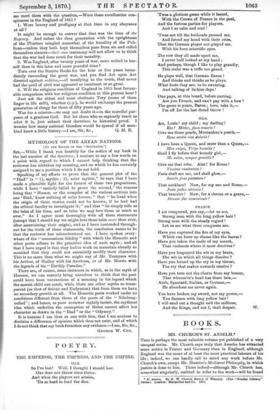MYTHOLOGY OF THE ARYAN NATIONS.
[TO THE EDITOR OE THE "SPECTATOR."] SIR,—While I thank you heartily for the notice of my book in the last number of the Spectator, I venture to say a few words on a point with regard to which I cannot help thinking that the reviewer has mistaken my meaning, and on which he has certainly assigned to me a position which I do not hold.
Speaking of my efforts to prove that the general plot of the "Iliad" is " 1), mythic ; 2), solar mythic," he says that I have made a plausible fight for the former of these two propositions, while I have " entirely failed to prove the second," the reasons being that " Homer, or the compiler of the various sections into one 'Iliad,' knew nothing of solar heroes; " that " he lived when the origin of these stories could not be known, if he had had the critical faculty to investigate it ; " and that " he simply tells us the tales of his time, and as tales we may love them as much as ever." As I agree most thoroughly with all these statements (except that I should say we might love these tales more than ever, after ascertaining their origin), and as I have contended through- out for the truth of these statements, the conclusion seems to be that the reviewer has misunderstood me. I have spoken every- where of the " unconscious fidelity " with which the Homeric and other poets adhere to the primitive idea of each myth ; and all that I have urged is that they had to work on materials already so moulded that they could not essentially modify their character. This is no more than what we might say of Mr. Tennyson with his Arthur, of Shelley with his Arethusa, or of Mr. Morris with the legends of his "Earthly Paradise."
There are, of course, some instances in which, as in the myth of Hermes, we can scarcely bring ourselves to think that the poet could have been unconscious of a meaning in his legend which the merest child can catch, while there are other myths so trans- parent (as that of Selene and Endymion) that from them we have no secondary growth at all. The Homeric poets worked under no conditions different from those of the poets of the " Nibelung- enlied"; and hence, as your reviewer rightly insists, the mythical idea which underlies the conception of Helen cannot affect her character as drawn in the "Iliad" or the "Odyssey."
It is because I am thus at one with him, that I am anxious to disclaim a difference of opinion which does not exist, and of which I do not think that my book furnishes any evidence.—I am, Sir, &c., GEORGE W. Cox.






























 Previous page
Previous page